Berlusconi: Rise and Fall of a Modern Day Caligula
Looking at the rare phenomenon that the Portuguese writer José Saramago recently defined The Berlusconi Thing, [1] a foreign—or even an Italian—observer could have the impression to be standing before a reality that is unique for its sadness and perversity in the context of Italian politics.
Actually, leafing through the pages of its history, we can notice that, in the past, the land of Dante produced several grotesque—but dramatically real—characters who resemble the present Prime Minister of the country that, as Antonio Tabucchi stated, “is always at the vanguard both of beauty and ugliness.” [2]
 I will limit my parallels to three historical rulers who are eloquent examples of the recurrent sickness of the Italian leadership, and I will then point out whence Berlusconi’s peculiarity—when compared to those notable figures—comes from. We will learn that capitalism has been able to turn the abnormality of ruthless power into something even more alienated.
I will limit my parallels to three historical rulers who are eloquent examples of the recurrent sickness of the Italian leadership, and I will then point out whence Berlusconi’s peculiarity—when compared to those notable figures—comes from. We will learn that capitalism has been able to turn the abnormality of ruthless power into something even more alienated.
Gaius Julius Caesar Germanicus, better known with his nickname of Caligula, was the Roman Emperor from AD 37 to 41. The historical reports describe the first two years of his reign as moderate, following a period of harsh, violent confrontations—which would continue with and after his death.
 It could be interesting to highlight how also Berlusconi presented himself as a moderate candidate when he ran for the first time for the charge of Prime Minister in 1994. At the time, the nationwide judicial investigation into political corruption known as mani pulite (that is, clean hands) had led to the disappearance of the majority of the old parties and had left an empty space in the centre-right side of the political chessboard, a space that Berlusconi occupied proclaiming himself the ultimate bulwark of free market and freedom against the imaginary threat of a supposedly resurgent Communism. (Actually, the strength of the left-wing parties in Italy was waning since when the former PCI—Partito Comunista Italiano, that is, Italian Communist Party—had switched towards social-democratic positions.) Thanks to the support of the xenophobic Lega Nord (Northern League)—that represented the biases and hatred of the northern, richest part of Italy against the rest of the country and the immigrants—and Alleanza Nazionale (National Alliance)—a party founded on the ashes of a neo-fascist movement—, Berlusconi won his first mandate and started ruling Italy enforced by a conflict of interests that a weak, confused left guiltily underestimated and didn’t fight from the beginning as it should have done: The man who now held the helm of the government was also the head of an economic empire that ranged from the ownership of TV channels and newspapers to that of building corporations and a soccer team.
It could be interesting to highlight how also Berlusconi presented himself as a moderate candidate when he ran for the first time for the charge of Prime Minister in 1994. At the time, the nationwide judicial investigation into political corruption known as mani pulite (that is, clean hands) had led to the disappearance of the majority of the old parties and had left an empty space in the centre-right side of the political chessboard, a space that Berlusconi occupied proclaiming himself the ultimate bulwark of free market and freedom against the imaginary threat of a supposedly resurgent Communism. (Actually, the strength of the left-wing parties in Italy was waning since when the former PCI—Partito Comunista Italiano, that is, Italian Communist Party—had switched towards social-democratic positions.) Thanks to the support of the xenophobic Lega Nord (Northern League)—that represented the biases and hatred of the northern, richest part of Italy against the rest of the country and the immigrants—and Alleanza Nazionale (National Alliance)—a party founded on the ashes of a neo-fascist movement—, Berlusconi won his first mandate and started ruling Italy enforced by a conflict of interests that a weak, confused left guiltily underestimated and didn’t fight from the beginning as it should have done: The man who now held the helm of the government was also the head of an economic empire that ranged from the ownership of TV channels and newspapers to that of building corporations and a soccer team.
Such a concentration of powers in the hands of a single man wasn’t (isn’t) typical of any modern democracy: it reminded (reminds) instead of the ages when it was normal, say, for an Emperor, a King, a Pope, or a feudal Lord, to dominate the cultural, economic and political reality of the territory he ruled.
Let’s come back to Caligula: The historical sources that narrates his life focus upon his cruelty, extravagance and sexual perversity. The most known episode of his controversial reign is maybe his attempt to appoint his horse as a member of the Senate—that part of the Roman state that had the strength to counterbalance the otherwise unlimited power of the Emperor. This attempt has always been interpreted as an evidence of Caligula’s madness; obviously, we wouldn’t say that such an attempt is typical of a ‘normal’ man, but we shouldn’t forget that its real aim was that to show that the Emperor had the right to do whatever it pleased him—quite like Berlusconi, who will never resign in spite of all the allegations of corruption, abuse-of-power and the sexual scandals he has to face.
We could also indulge on some easy irony saying that many of the characters appointed by the Italian Prime Minister as key figures of his governments were and are maybe less worthy of their charges than Caligula’s horse was…
It’s not pointless to remind that Caligula is also the main character in the eponymous play by the French author Albert Camus, in which the Emperor is said to use his unfettered power to “bring the impossible into the realm of the likely.”
This interpretation of Caligula’s personality leads us to look at it under a Lacanian perspective: The ruler with unlimited powers is the individual who tries to overcome his castration complex by transforming his Imaginary Phallus—that is, his narcissistic dream of omnipotence in which sexual power is intermingled with political and economic power—into something ‘real’ .
This intermingling is typical of a patriarchal conception of the political and social structure. In this scheme of things, an almost omnipotent ruler struggles to conquer the absolute power that his Oedipal side knows it lacks of, in order to become himself the Archetypical Father.
It is not a coincidence that, after the last and maybe the worst of the sex scandals he was involved in—the affair with a 17 years old Egyptian belly dancer that induced Gianfranco Fini, his former, staunchest ally (an ‘imaginary’ son, under a Lacanian perspective), to rebel against him and ask him to resign—Berlusconi felt his patriarchal virility and dominion so threatened that he made restore Mars’s penis to an ancient Roman statue that is misplaced into his Roman home: a symbolic re-edification of his Phallus, impulsed by his castration complex. (By the way, the re-carving and attachment of Mars’s missing penis costed €70,000 to the Italian taxpayer.)
A horrified art historian said about this “It’s horrific. You just can’t add on bits ad hoc to these works of art—the penis [of Mars] and hands [of Venus] may well have been there originally and then removed but you cannot add something on like a plastic model.” [3]
The fact is that Berlusconi, who is well known for his own cosmetic surgery, face lifts and hair transplants, retroceded to a fetishistic phase of his sexuality, in which the object is taken as a symbolic substitute of the true sexual organ (a little bit like George W. Bush playing with Saddam Hussein’s pistol—that he held as a trophy—after the capture of the former Iraqi leader); furthermore, the ‘rape’ of a work of art (you cannot intervene, as the art historian stated, on an ancient art work replacing its missing parts) arises from an industrial, mechanical, capitalistic conception of art itself, which doesn’t consider an art work under the light of his moral (see Walter Benjamin’s idea of ‘cult value’) [4] and aesthetic value, but as a functional object with a political meaning whose parts may be substituted as in a mechanical, industrial process.
Matteo Orfini, shadow culture spokesman for the opposition party Democratic Left, thundered “This is absolute madness. It’s as if we are back in the Middle Ages when the ruling regimes did whatever they wanted.”
Well, that is exactly what we pointed out above.
The same concept was expressed as follows by Tobias Jones in the 16 November 2010 issue of The Guardian: “Berlusconi has repeatedly come across as nothing more than a feudal groper and a doddery old bigot. […] He gives the impression he really does believe in droit de seigneur, the medieval ritual that the overlord should have first pickings of his kingdom’s virgins.” [5] That, we add, is another evidence of the patriarchal mentality of Italy’s Prime Minister: It’s not necessary to have studied Bachofen’s theories to understand it.
Berlusconi’s attitude reminds us also of another historical Italian character whom I mentioned before: Niccolò III of Este, Marquis of Ferrara (Northern Italy) from 1393 until his death, in 1441. Matteo Bandello, an illustrious Italian novelist who rivaled with the very same Petrarch, nicknamed him ‘Il gallo di Ferrara,’ that is, ‘The cock of Ferrara,’ alluding to his intense sexual activity; he was believed to have had up to eight hundred lovers (besides his three wives). It was one of his bastard sons—Leonello—who succeeded to him as Marquis of Ferrara after being legitimized by Pope Martin V. Bandello stated that “there was no household in Ferrara or in the county where he had not bastard sons.” A popular proverb said: “Di qua e di là dal Po son tutti figli di Niccolò,” that is, “On both banks of the Po (the river that flows through Ferrara), everybody is a son of Niccolò.”
The analogy with Berlusconi can be easily found both in his unstoppable sexual life and in his patriarchal demeanor. The latter can be also recognized in an appalling episode of Niccolò’s life, which—apart from his bellicosity and his fondness for women—is the main reason why he is remembered and was recorded in the works of several writers throughout the centuries: The history of Ugo and Parisina. In 1418, Niccolò married to Parisina Malatesta, a girl of 15 (this may surprise us, but we should remember that that was the age at which girls were married at those times—not a Berlusconi-like flirt then, even if in the relations with young girls we may found the same patriarchal pattern); she was so beautiful that one of the (legitimate) sons of Niccolò, Ugo, lost his head for her, both in a sentimental and in a literal way: On 21 May 1425 both Ugo and Parisina were executed for an alleged affair. It is reported that, as a sign of utter despise, they were beheaded, one after the other, on the same chop. (This beheading may be seen as a symbolic castration of a modern Oedipus by a jealous father.)
It would be interesting to open a parenthesis on Berlusconi’s fondness for young girls—not just women in general—, since it makes him appear quite like the father of the primitive horde who had the sexual dominion over all the females of his tribe, as theorized by Sigmund Freud in his work Totem and Taboo. The last year the nation was shocked by the fact that Berlusconi participated to the eighteenth birthday of a Neapolitan girl, Noemi Letizia, who had apparently no reason to know him personally, since she was a member of a low-middle class family which had no possible link neither with the world of politics nor with the Prime Minister. The opposition immediately solicited an investigation and asked Il Cavaliere to explain how his ‘friendship’ with the girl could be justified. There were—and there are still—reasons to suspect that, if Berlusconi participated to her eighteenth birthday, he knew her before, so that their ‘friendship’ would date to a period in which the girl was a minor. Still, in Italy the age of consent is fourteen and it was the very same Noemi Letizia who candidly admitted that Berlusconi was a dear friend of his father’s (although nobody could explain where and how the two men could have met and have become friends) and of hers. She even showed a diamond that ‘Papi’ gave her as a gift for her birthday. Yes, ‘Papi’, that is, ‘Daddy’, aka the very same Berlusconi. Now, while for example in Latin American Spanish is normal to call a lover or—jokingly—anybody else ‘papi’, this term is used in Italian only to address the father, never a lover. Is it Electra complex? And, we may ask provocatively: Is Berlusconi really the father of the primitive hoard into which Italy is turning again?
The third historical character whom Berlusconi may be compared to is the Spaniard Roderic Llançol Borja, Italianized as Rodrigo Borgia, who was Pope with the name of Alexander VI from 1492 to his death in 1503. Again, we face with a ruler whose power was marked, in its beginnings, by a fair and strict administration of justice and an efficient, rational government. But the Catholic world didn’t have to wait long before its head manifested a despotic and immoral behavior. Those were times in which even the Popes were allowed ‘liberties’ that would be unthinkable today; however, Alexander VI surpassed all his predecessors (and successors) in his thirst for power and lack of morality. Not only a man who was supposed to be celibate and chaste had several mistresses (which, as we said before, was not per se an unprecedented phenomenon at the epoch), but he had five children by his favorite one, Vannozza Cattani, without even feeling or having the need to hide or justify it: On the contrary, he endowed his sons and daughters with power, using them at the same time to achieve political alliances, as if he were a Prince instead of a Pope. Since his older child, Cesare Borgia, was a violent, ruthless, powerful capitano di ventura, that is, a military commander and conqueror—beside being the Archbishop of Valencia—and Alexander VI himself was an inflexible ruler, up to the point not to hesitate murdering his enemies, nobody dared to oppose his nepotistic politics.
Maybe that is exactly the focal point which may help us understanding the limits of tolerability of the abuse-of-power in the conscience of the Italian people: Even if, on the one hand, Italians are repressed by centuries of Catholic rule, on the other, they are far less puritans than other peoples and have a highest level of tolerance of sexual scandals; what they cannot tolerate, though, is nepotism: It is when the ruler not only abuses of his power but also imposes it to appoint people related to him to functions they don’t deserve, that he starts losing the approval and the support of the people. It’s what is also happening in contemporary Italy: Many Italians don’t really care about how many mistresses Berlusconi has or how many orgies he organizes in his private mansions; what really matters is that sex became the tool for Berlusconi’s mistresses or their relatives and friends to obtain jobs, key political positions, money, power.
Here we come to the real difference between Berlusconi and the other characters we introduced above. My thesis is that this difference lays on the essence of the exchange value which permeates every kind of human, social and political relation in the capitalistic era of commodity production. As Fritz Pappenheim pointed out in his work Alienation in American Society, [6] “our economic system is market-centered; it is essentially a system of commodity production. A commodity is characterized by the split between its exchange value and its use value; the exchange value becomes more important than the use value, the intrinsic value. We thus produce and sell commodities, not because we have an inner relationship to their intrinsic value but because we are interested in their exchange value. […] As we are related only to one fraction of the commodity, the exchange value, so also in personal associations we are related only to one fraction of other individuals, not to their intrinsic value as human beings.”
So, in this capitalistic society, even sexual intercourse, orgies, either are ‘bought’ (as in the famous case of the escort Patrizia D’Addario, who allegedly accepted €30,000 to have sexual relations with Berlusconi) or ‘sold’ to obtain fame or power (it is said, for example, that Berlusconi persuades young girls to have sex with him promising them to become soubrettes in the shows of his private TV channels). So, sex is used as a commodity, benefiting of its exchange value.
We may highlight the new capitalistic perspective this way, too: Neither Caligula, nor Niccolò III, nor Alexander VI ever paid to have sex or needed to offer benefits in order to seduce a woman. Of course, their mistresses benefited from their status, but this was a consequence, not a condition nor the fruit of using sex as a commodity.
Berlusconi also upsets his Italian opponents because he incarnates a peculiar, Italian way to capitalism which is intermingled with the traditional Mafia superstructure and makes even more evident this extreme commercialization of labor, social life and even culture.
Regarding the latter, we witness a series of paradoxes: On the one hand, Il Cavaliere spends taxpayers’ money to restore the penis of Mars’ ancient statue in his Rome residence (just to symbolically reaffirm—as we stated above—his patriarchal dominion); on the other hand, in the very same days, the bimillenary House of the Gladiator, in the prestigious archeological complex of Pompeii, crumbles after innumerable calls by the local authorities to the central government to do something since Pompeii lays in a state of complete abandon. As Tabucchi wrote in the article we cited above, in Italy “elegance is an object of exportation, a matter of commerce. In the public administration there are underministries entrusted with the care of the made in Italy. During the last times, the Italian institutes of culture had their budgets drastically cut. As the time passes by, Italian culture risks to be represented not by books or paintings, (or, we may add, archeological patrimony), but by the commercial label of the made in Italy.”
The great difference with the past lays in the fact that, for example, the three absolute rulers we compared to Berlusconi or any other ancient prince, Pope, emperor or feudal lord, would have used (actually, they used) art as a form of propaganda, but at the same time they considered it also a tool to show their power and their glory, which matched with the honor, the wealth and the pride of the people whom they ruled upon—or, in the case of the Popes, even to exalt the glory of God through the magnificence of churches, cathedrals and the beauty of sacred art. What Berlusconi wants to do with Italian artistic patrimony, instead, is… to privatize it: In the previous legislation (2001-2006), il Cavaliere attempted to privatize prestigious Italian museums (such as Florence’s Uffizi) and monuments, but he had to recede from his project because of the firm, indignant opposition of the world of culture, the very same culture that—as it is demonstrated by these examples—is sacrificed again on the altar of profit, reduced to a commodity.
Berlusconi’s capitalistic attack against culture is twofold: On the one hand, it is reduced—as we said—to a commodity, on the other it is vulgarized. We borrow again Tabucchi’s words: “After the beginning of the 1980s, Berlusconi’s TV chains engaged in the task of lowering the level of esthetics. […] The palimpsest of the programs has been entrusted to communication experts who endeavored to vulgarize the contents, since the only thing they cared of was audience. They practiced the generalized anathema, the destruction of good taste, of the sense of citizenship, of the art of social living. […] It is far easier to show rubbish instead of the best cultural contents. Human beings are basically animals: The education to beauty and civic responsibility arises from a social contract which implies an effort. But, because of audience, public television followed the path of vulgarity.”
It’s amazing to find the same concept in Walter Benjamin’s essay The Work of Art in the Age of Mechanical Reproduction, a text written in 1936: “In the decline of middle-class society, contemplation became a school for asocial behavior, it was countered by distraction as a variant of social conduct.”
Another paradox is represented by the contrast between the scarce importance that Berlusconi’s government gives to the arts and education (cutting funds to both) and his obsession for his own image, his own esthetics, which makes him submit to a cosmetic surgery after another. We find again the explication of this paradox in Benjamin’s theory about fascist esthetics and the masses: “Fascism attempts to organize the newly created proletarian masses without affecting the property structure which the masses strive to eliminate. […] The masses have a right to change property relations; Fascism seeks to give them an expression while preserving property. The logical result of Fascism is the introduction of esthetics into political life.” [The italics is mine.]
We mentioned before the fact that, according to Pappenheim, even political choices are submitted to the logics of exchange value, as if they were commodities: “Decisions of political leaders and groups often do not emanate from a commitment to ideas or from a political vision of the future; they are taken on the basis of an expected quid pro quo. The political calculates: If I or my group delivers the commodity, the receiver of the merchandise will have to reciprocate and come forth with payment of an equivalent exchange value.”
That’s exactly the reason why Berlusconi won even the last vote of confidence when everybody was expecting that it were the last chapter of his political career. Of course, there were also rumors about corruption, votes buying and threats to Il Cavaliere’s former allies, now rebels: Those rumors were not completely unfounded, but that wasn’t the point. The real issue was that Berlusconi’s opponents didn’t dare to make his government fall now, in a moment in which Italian economy is sinking and is seeing the same ghosts Greece and Ireland had to deal with and Portugal and Spain feel threatened by: Their perception was that, had they done that, voters would have ‘punished’ them not giving them their votes in the anticipated elections. We can see how political convenience prevailed over moral concerns and the safeguard of the democratic principles.
We should now try to draw a conclusion from the line of reasoning we have followed until now. Berlusconi’s extraordinary resilience to every scandal, accusation, and evidence of corruption makes it seem unlikely the ‘fall’ that is foreseen by the title of the present article. Though, Gianfranco Fini defined his last survival after the vote of confidence ‘a Pyrrhic victory’, since the majority upon which Berlusconi may count is now really exiguous: It would be impossible for Il Cavaliere to govern with the numbers he has, so that the most probable scenery will be the call of anticipated elections in the next spring. Berlusconi—and the polls seem to confirm it—believes the voters will really punish his opponents for drawing the government into a crisis in a difficult moment for the economy and will vote for him to guarantee a political continuity that could permit Italian finance to float during the recession.
However, it will probably be the very same capitalism that ‘created’ Berlusconi which will wage a war against him: He has done nothing for Italian economy since his only concern, lately, was that to make the parliament approve laws which (unconstitutionally) protected him from the numerous accusations of corruption: It will be corporations and lobbies which will make all the efforts to promote another, more manageable champion of their interests.
We can notice here another difference between ‘old’ and ‘new’ politics: There isn’t the need for physical assassination to remove a ruler who has turned himself into a sort of a tyrant, since the capitalistic despot will be defeated by the very same capital (we may consider this another face of alienation): It will be an ‘economic’ assassination. Berlusconi won’t be able anymore to present himself as the bulwark of free market and the very same capitalistic centers of power will find a way to oust him.
Though, even if Berlusconi will be excluded from the political scene, many problems that won’t permit a real change will remain: The culture of opportunism, appearance, and superficiality; capitalistic exploitation and money fetishism; the vulgarization of culture; the individualization of social life, won’t die with Berlusconi, even if he contributed heavily to create this sad panorama: With or without Il Cavaliere, Italy won’t recover from its decadence if another cultural wave, another Renaissance which will wipe away the capitalistic decay won’t arise.
Many say that what Italy lacks of in order to achieve this goal is a charismatic leader—and it cannot be denied that Berlusconi benefited from the absence of a competent opponent who could defy him both on the terrain of economy and that of culture, challenging him with the proposal of a different model of society, more democratic, less corrupt, nepotistic and individualistic. But if we always wait for a leader who rescues us, we risk withering… en attendant Godot.
It is time for the Italian people to gather and promote a cultural and economic way of life alternative to the capitalistic one. If we won’t do it, another risk is lurking in the shadow: That of the explosion of violence of the frustrated masses who don’t find either in politics or in society and culture their true, full expression. The images of the riots that ravaged Rome the day Berlusconi obtained his last, ‘Pyrrhic’ victory, speak for themselves and, if they remind us of the anni di piombo (the years of lead, a metonymy for the bullets, alluding to the turmoil of the 1970s), we cannot be surprised because, as Walter Benjamin warned, “all efforts to render politic aesthetic [as Berlusconi did] culminate in one thing: war. War and war only can set a goal for mass movements on the largest scale while respecting the traditional property system.” International or civil war—even a ‘cold’ war, that put in practice the ancient Roman teaching for rulers, divide et impera—is what the new Fascism of capital needs to survive. In order not to fall into this trap, we need to form a new popular conscience arising not from the mercantilism of exchange value, but from equality, justice and solidarity.
[1] La cosa Berlusconi, by José Saramago, El País 6/6/2009 http://www.elpais.com/articulo/internacional/cosa/Berlusconi/elppgl/20090606elpepuint_16/Tes
[2] Berlusconi a abaissé le niveau esthétique, by Antonio Tabucchi, Le Monde 11/10/2008 http://www.lemonde.fr/cgi-bin/ACHATS/acheter.cgi?offre=ARCHIVES&type_item=ART_ARCH_30J&objet_id=1054486&clef=ARC-TRK-NC_01
[3] Berlusconi spends taxpayer money for Roman statue’s fake hands and ‘privates’, Daily Mail 18/11/2010 http://www.dailymail.co.uk/news/article-1330944/Berlusconi-builds-Mars-Venus-statue-penis-fake-hands.html
[4] Walter Benjamin, The Work Of Art in the Age of Mechanical Reproduction (1936) http://marxists.org/reference/subject/philosophy/works/ge/benjamin.htm
[5] How can Silvio Berlusconi still be in power?, by Tobias Jones, The Guardian 16/11/2010 http://www.guardian.co.uk/world/2010/nov/16/italy-cant-ditch-silvio-berlusconi?INTCMP=SRCH
[6] Alienation in American Society, by Fritz Pappenheim, Monthly Review, june 2000 http://www.monthlyreview.org/600papp.htm
Editor’s Note: Antonio Marcantonio was born in Rome in 1974. After graduating in Linguistics at the University of Rome “La Sapienza”, he taught Italian Language, Literature and Linguistics at the University of Puerto Rico. Back in Europe, he’s now living in Madrid. He’s a political activist and an expert in Freudo-Marxism. You can follow this author on Twitter.
Related Articles


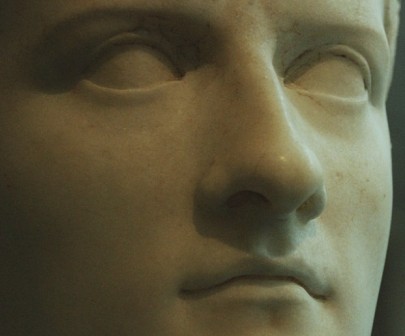
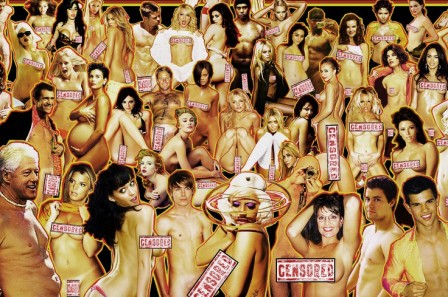
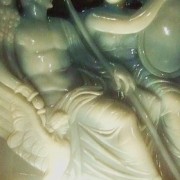
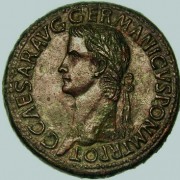
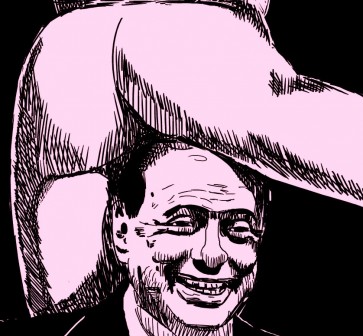
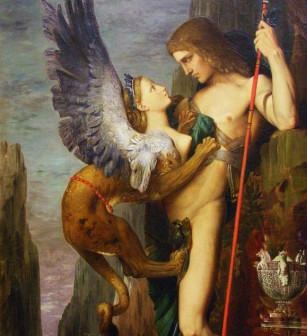
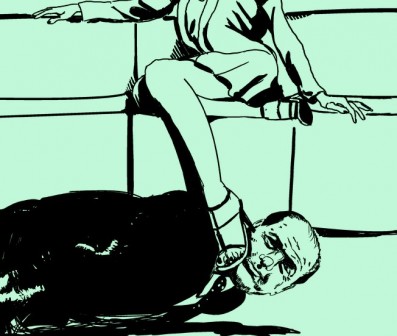
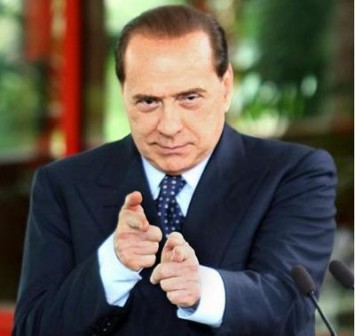
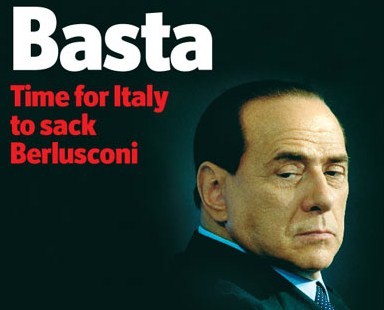
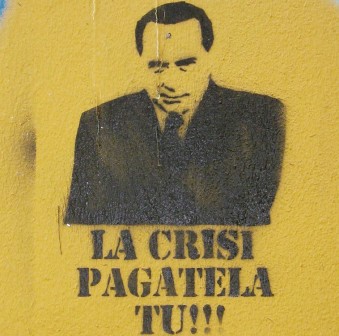











4 Responses to Berlusconi: Rise and Fall of a Modern Day Caligula
You must be logged in to post a comment Login